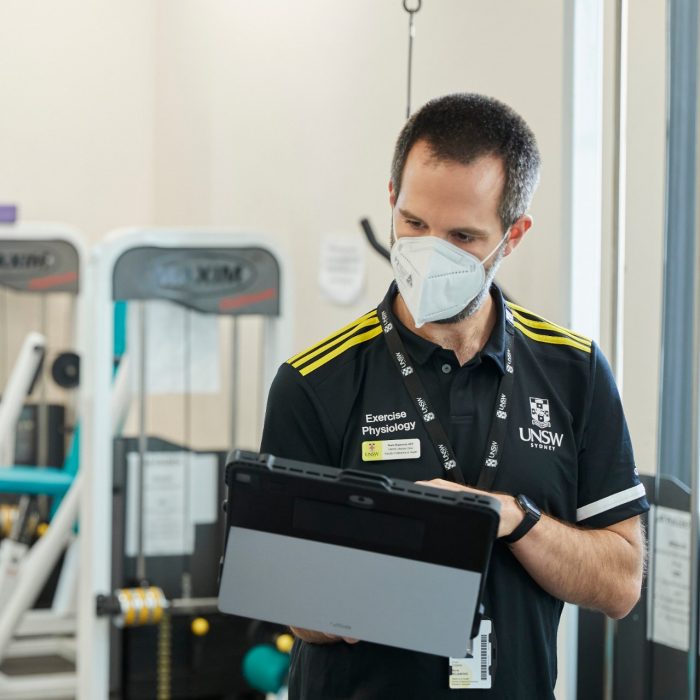Research projects

As a leading health service and research centre, the Lifestyle Clinic conducts diverse research projects. The clinic has established multiple collaborative research partnerships across the university, as well as in local area health services, local divisions of general practice and health advocacy groups.
Different research projects run at different times in the Lifestyle Clinic. If you are interested in finding out more about our current projects, please contact us.
Our current research projects
UNSW Lifestyle Clinic - Chronic Conditions Survey
The Lifestyle Clinic is conducting a survey to identify the relationship between cognition, quality of life and physical activity in people with chronic conditions. The survey will take between 20-60minutes, depending on your conditions. You will be guided through the survey with a study investigator with your choice of face-to-face or telehealth. If you would like to participate or would like further information, please email Dr Claire Burley at c.burley@unsw.edu.au.
Meta-Health Clinic
The Meta-Health Clinic trial aims to improve cardiometabolic health, quality of life and reduce pain in people living with type 2 diabetes and osteoarthritis. The Meta-Health Clinic is a feasibility study that follows on from the Diabetes Clinic designed and delivered by Dr Kelly McLeod.
The Meta Health Clinic is a 10-week multidisciplinary group exercise, nutrition, and self-management program or an individual telehealth counselling for older adults with type 2 diabetes and osteoarthritis. The Meta-Health Clinic will be delivered within the UNSW Medicine & Health Lifestyle Clinic, with the aim of improving type 2 diabetes and osteoarthritis management through increased participation in healthy lifestyle behaviours. If you are interested in participating in the trial or would like further information, please contact Dr Kelly McLeod at k.mcleod@unsw.edu.au.
Healthy Body & Mind Program
The Healthy Body and Mind Program is a pilot study aiming to improve quality of life, reduce pain, and reduce dementia risk in people living with cognitive decline and osteoarthritis.
The Healthy Body & Mind Program is a 12-week community-led and co-designed lifestyle education and physical activity program. The program will be individually tailored, considering each person’s health status, risk factors, and personal abilities and expectations. The program was designed in consultation with the community, dementia advocates, health and medical professionals, and will be conducted face-to-face at the UNSW Medicine & Health Lifestyle Clinic. If you would like to participate or would like further information, please email Dr Claire Burley at c.burley@unsw.edu.au.
Iso Ex
The Iso Ex study is investigating the effect of different types and durations of isometric and overhead exercise on blood pressure during and after exercise in varying populations.
The results of this project will provide important insight into the acute effect of different types and durations of isometric exercise, and overhead resistance exercise, on blood pressure in adults. The data may be used to inform exercise guidelines for people with high blood pressure (hypertension) who are currently advised to avoid isometric and overhead resistance exercise due to their effect of acutely increasing blood pressure. If you would like more information, or are interested in being part of the study, please contact Dr Matthew Jones at matthew.jones@unsw.edu.au or 02 9385 3375
Keeping the Body in Mind Program
The Keeping the Body in Mind program has a track record of delivering lifestyle interventions targeting the physical health of people living with mental illness. This program based at the UNSW Lifestyle Clinic is for people living with severe mental illness (e.g., schizophrenia, schizoaffective disorder, major depressive disorder, bipolar disorder) who are not currently managed by public mental health services. This service is only available to those within the Central and Eastern Sydney PHN. If you would like to participate or would like further information, express your interest here or phone 0401 979 228.
Diabetes Clinic
Older Australians experience a higher incidence of Type 2 Diabetes, with 15.4% of those aged 65-74 years and 18.7% of those aged 75 years and over having the condition. UNSW researchers are looking for people over 65 with type 2 diabetes to participate in a study evaluating a diabetes group service consisting of exercise and healthy lifestyle education run within the UNSW Lifestyle Clinic. If you would like to participate or would like further information, please contact Kelly McLeod at diabetesclinic@unsw.edu.au.
Improving Exercise Physiology Outcomes Through Reinforcement Learning
Machine learning is poised to play an increasingly prominent role in medicine and health care because of advances in computing power, learning algorithms and the availability of large datasets. Exercise physiology, which involves the personalised adaptation of training intensity and volume over time to achieve training goals, is particularly well-suited to the application of reinforcement learning. This project will be the first to develop and test a reinforcement learning algorithm for exercise physiology. The algorithm will automatically determine the optimal training intensity and volume for a client, based on baseline clinical characteristics and routinely acquired pre- and post-exercise data. This research is being conducted by Dr Sebastiano Barbieri from the UNSW Centre for Big Data Research in Health in collaboration with the UNSW Lifestyle Clinic.
